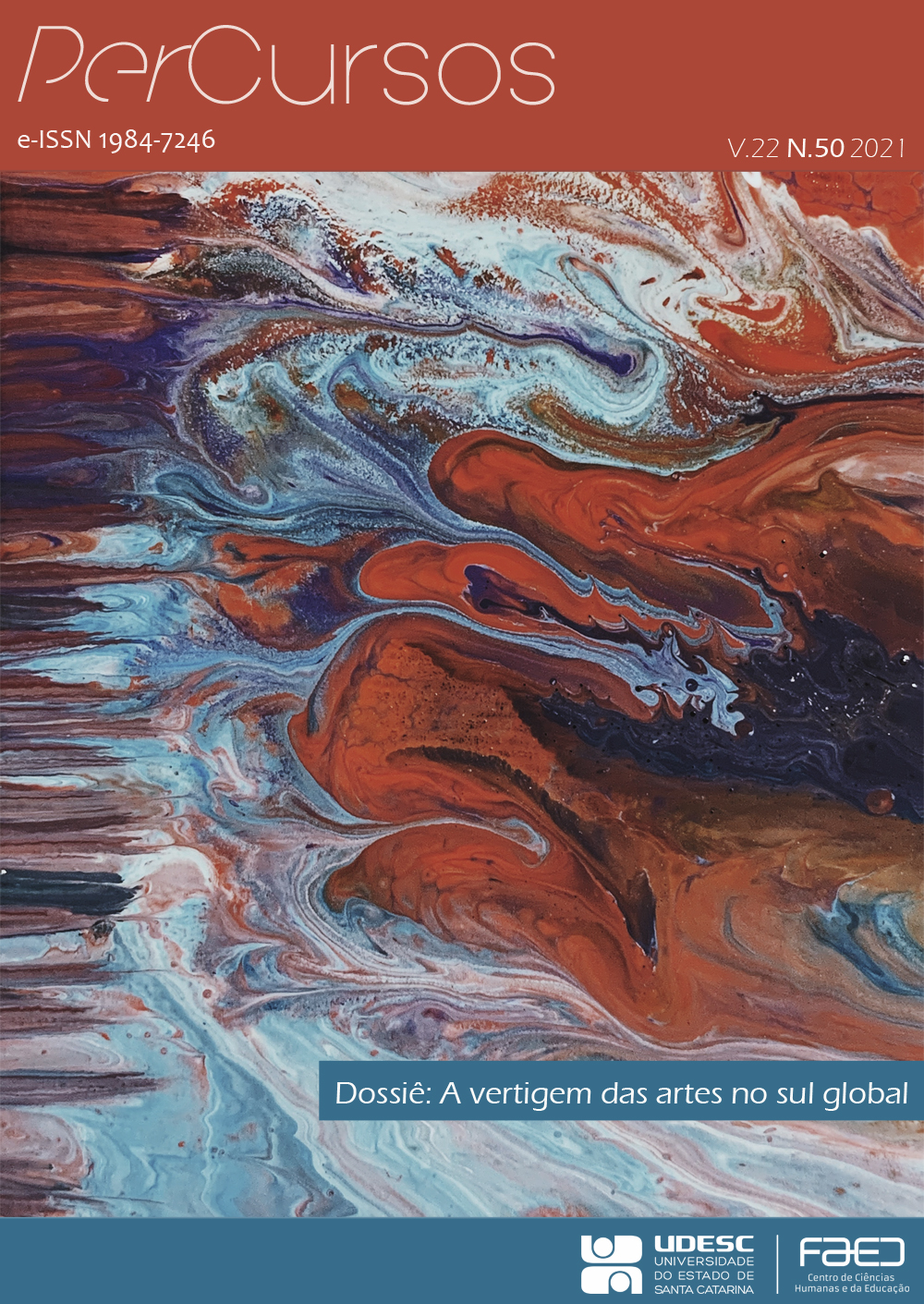Intersection points in women's writings in Argentina and Palestine: autofiction, trauma and postmemory
DOI:
https://doi.org/10.5965/1984724622502021215Keywords:
postmemory, trauma, female autofiction, State violenceAbstract
This article aims to propose points of contact between the experiences of violence and memory production in the context of Argentina and Palestine, based on the analysis of two different works, an autobiographical book written by the Palestinian Ibtisam Barakat and a memoir produced by a collective of children of Argentine repressors. Starting from different fields, the sources have a common analytical potential: women's contemporary writing, with narrative forms and relatable thematic concerns. Reflections are proposed on the analyzed works, considering two main objectives: how the “postmemory” can be a relevant category for thinking about these historical processes, based on a bibliographic review of the concept that tests it in marginal scenarios, and to conjecture about the place of female autofiction in the production of the recent past. Understanding postmemory as a critical device and in view of the temporal complexity that the Argentine and Palestinian cases raise, the use of the category can be an analytical possibility for the entanglement of memories reflected in these texts, despite the particularities of the effects of violence of State for each case.
Downloads
References
ABDO, Nahla. Feminism, indigenousness and settler colonialism: oral history, memory and the Nakba. In: ABDO, Nahla; MASALHA, Nur. An oral history of the Palestinian Nakba. London: Zed Books, 2018. p. 40-64.
ABU-LUGHOD, Lila. Return to half-ruins: memory, postmemory, and living history in Palestine. In: SA’DI, Ahmad; ABU-LUGHOD, Lila. Nakba: Palestine, 1948, and the claims of memory. New York: Columbia University Press, 2007. p. 77-104.
BARTALINI, Carolina; STANGE, Verónica Estay (orgs.). Escritos desobedientes: historias de hijas, hijos y familiares de genocidas por la memoria, la verdad y la justicia. Ciudad Autónoma de Buenos Aires: Marea, 2018.
BASILE, Teresa. Infancias: la narrativa argentina de HIJOS. Córdoba: Editorial Universitaria Villa María Eduvim, 2019.
BASILE, Teresa. Ditadura argentina em foco: a problemática das filhas e filhos de repressores por Teresa Basile. [Entrevista cedida a] Marina Lis Wassmansdorf. Fronteiras Revista de História, [Dourados], v. 22, n. 40, p. 202-220, jul./dez. 2020a.
BASILE, Teresa. Padres perpetradores. Perspectivas desde los hijos e hijas de represores en Argentina. Kamchatka. Revista de Análisis Cultural, [Valencia], v. 15, p. 127-157, jun. 2020b.
BARAKAT, Ibtisam. Tasting the Sky: a palestinian childhood. 1. ed. New York: Melanie Kroupa Books, 2007.
BOULLATA, Kamal. Palestinian Art: from 1850 to present. London: Saqi, 2009.
DUHALDE, Eduardo Luis. El Estado terrorista argentino. Buenos Aires: Eudeba, 1999.
FIGUEIREDO, Eurídice. Mulheres no espelho: autobiografia, ficção, autoficção. Rio de Janeiro: EdUERJ, 2013.
FOUCAULT, Michel. Vigiar e punir: o nascimento das prisões. Petrópolis: Editora Vozes, 2004.
GHANIM, Honaida. Thanatopolitics - the case of the colonial occupation in Palestine. In: LENTIN, Ronit (org.). Thinking Palestine. London: Zed Books, 2008. p. 65-81.
HIRSCH, Marianne. Family frames: photography, narrative and postmemory. Cambridge: Harvard University Press, 1997.
KALINEC, Analía. Manifesto. In: BARTALINI, Carolina; STANGE, Verónica Estay (orgs.). In: Escritos desobedientes: historias de hijas, hijos y familiares de genocidas por la memoria, la verdad y la justicia. Ciudad Autónoma de Buenos Aires: Marea, 2018a. p. 7-9.
KALINEC, Analía. Analía Kalinec. In: BARTALINI, Carolina; STANGE, Verónica Estay (orgs.). Escritos desobedientes: historias de hijas, hijos y familiares de genocidas por la memoria, la verdad y la justicia. Ciudad Autónoma de Buenos Aires: Marea, 2018b. p. 20-29.
MASALHA, Nur. The Palestine Nakba: decolonising history, narrating the subaltern, reclaiming memory. London: Zedbooks, 2012.
MASALHA, Nur. Decolonizing methodology, reclaiming memory: Palestinian oral histories and memories of the Nakba. In: ABDO, Nahla; MASALHA, Nur. An oral history of the Palestinian Nakba. London: Zed Books, 2018. p. 6-39.
PELLER, Mariela. Lugar de hija, lugar de madre: autofición y legados familiares en la narrativa de hijas de desaparecidos en Argentina. Criação & Crítica, [São Paulo], n. 17, p. 75-90, dez. 2016.
REIBALDI, Bibiana. Bibiana Reibaldi. In: BARTALINI, Carolina; STANGE, Verónica Estay (orgs.). In: Escritos desobedientes: historias de hijas, hijos y familiares de genocidas por la memoria, la verdad y la justicia. Ciudad Autónoma de Buenos Aires: Marea, 2018. p. 31-35.
ROBIN, Régine. La autoficción: el sujeto siempre en falta. In: ARFUCH, Leonor. Identidades, sujetos y subjetividades. Buenos Aires: Prometeo, 2002. p. 45-58.
SARLO, Beatriz. Tempo passado: cultura da memória e guinada subjetiva. São Paulo: Companhia das Letras; Belo Horizonte: UFMG, 2007.
SHALHOUB-KERVOKIAN, Nadera. Militarization and violence against women in conflict zones in the Middle East: a Palestinian case-study. New York: Cambridge University Press, 2009.
SZURMUK, Mónica. Posmemoria. In: SZURMUK, Mónica; MCKEE IRGWIN, Robert. (coord.). Diccionario de estudios culturales latitno americanos. México: Instituto Mora: Siglo XXI, 2009. p. 224-228.
TOLOSA, Jorge. Propuestas para decolonizar Palestina-Israel. In: MENESES, Maria Paula; BIDASECA, Karina. Epistemologías del sur. Buenos Aires: CLACSO, 2018. p. 273-298.
TRAVERSO, Enzo. O passado, modos de usar. Belém: edições UNIPOP, 2012.
TURIN, Rodrigo. A polifonia do tempo: ficção, trauma e aceleração no Brasil contemporâneo. ArtCultura, Uberlândia, v. 19, n. 35, p. 55-70, 2017.
VISENTINI, Paulo Fagundes. Editorial: Terceiro mundo ou sul global?. Austral, Porto Alegre, v. 4, n. 8, p. 7-8, jul./dez., 2015.
WARNOCK, Kitty. Land before honour: Palestinian women in the occupied territories. London: Macmillan, 1990.
WHITE, Hayden. O passado prático. ArtCultura, Uberlândia, v. 20, n. 37, p. 9-19, 2018.
Downloads
Published
How to Cite
Issue
Section
License
Copyright (c) 2021 PerCursos

This work is licensed under a Creative Commons Attribution-NonCommercial-NoDerivatives 4.0 International License.


